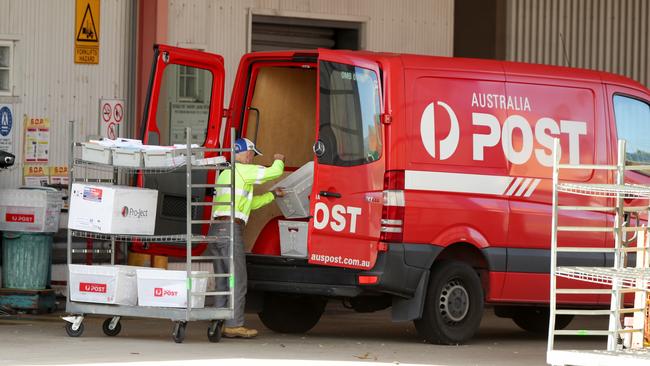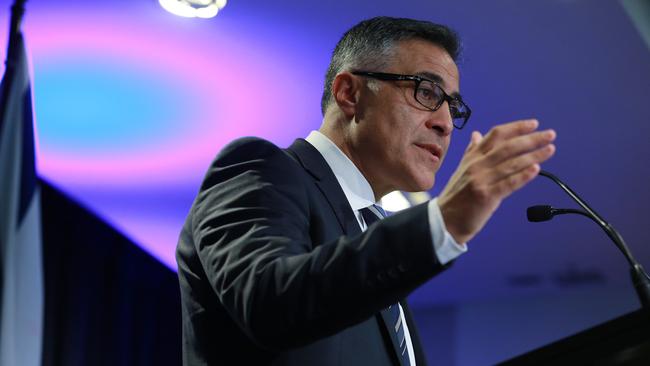‘What exactly are we paying you for?’
AUSTRALIAN taxpayers are now paying more and more for postage — so why can’t Australia Post even deliver a package?

AUSTRALIAN taxpayers are now paying more and more for postage, so why can’t Australia Post even deliver a package?
That’s the message from irate customers, who have flooded the postal service’s Facebook page with a litany of complaints about lost letters, long waiting times and package delivery fails.
But despite the complaints, Australia Post says its service is actually getting better.
The company has also defended the $2.1 million salary of CEO Ahmed Fahour, saying he turned down a $2.9 million performance bonus.
‘WHAT ARE WE PAYING FOR?’
Customer Jennifer English Poole vented on Facebook after tickets for her daughter to see The Wiggles at Sydney Opera House on Australia Day turned up the day after the concert.
“Awesome effort. Not sure what we should do with them now as obviously we missed the concert,” she wrote.
Miradija Fitzell complained it had been a week since she sent an Express envelope from Adelaide to Darwin.
“A week! It’s been sitting in a Darwin post office for seven days. Last time I’ll pay for Express,” she wrote.
Helen Dawes added: “Christmas presents delivered to Western Australia today. Only taken six weeks to get there. My grandchildren get their presents, I suppose better late than never. Would like reimbursement for my Express postage.”
Australia Post appears to be in a unique situation where prices are increasing as the service gets poorer.
Last weekend, Far North Queensland couple Mark and Jharna Hogan were shocked to discover a parcel containing hearing aids worth thousands of dollars casually chucked on their front lawn.
And late last year, Sydney business owner Julie Salama was outraged when CCTV footage captured by her home security system caught a lazy postie in the act of giving her ‘the slip’ without even attempting to deliver her parcel.


‘SERVICE IS GETTING BETTER’
But according to Australia Post, its service is actually getting better.
“There has been no reduction in Australia Post’s service levels,” a spokeswoman said.
Under its legislated Community Service Obligations, Australia Post is required to deliver 94 per cent of letters on time or early.
“We have consistently met our Community Service Obligations (CSOs) for the past 15 years,” she said. “These CSOs are measured quarterly and are independently audited. In 2014-15 we again exceeded our CSO by delivering 94.8 per cent of letters on time or early.
“Australia Post delivers to 11.4 million delivery points across Australia, with 98.8 per cent of these points receiving deliveries five days a week.
“Our employees take great pride in the safe and efficient delivery of mail across the country.”
But asked whether there had been an increase in customer complaints, Australia Post said it does not share that data with the public.
‘KNOCK AND CALL’ SYSTEM
Another common complaint is the dreaded delivery slip.
“Thanks Australia Post for NOT delivering my parcel today while I was at home,” Olimpia Fama wrote on Facebook. “Especially thankful that I paid extra to have it delivered Express only for your lazy courier driver to deliver me a card for ME to collect it.
“Sorry but what exactly are we paying you for then? If I wanted to go out and collect my parcel I would have gone in-store. I watched the courier driver from my house and the distance from the road to the front door is five metres. Your drivers are disgraceful. I now have to take time off work to collect the parcel because I can only collect it during work hours.”
But the company’s spokeswoman said since 2014, Australia Post had implemented a “knock and call” system where drivers must knock three times and call once when attempting to deliver a package.
“We have received very positive customer feedback on this process since it was launched,” she said. “We welcome feedback from our customers and encourage them to contact us and let us know if our delivery drivers are not attempting delivery to the door.
“That way we can follow up with our drivers in that area to ensure they do follow our national policy of ‘knocking and calling out to the door’ before leaving a card behind.”
Asked whether drivers had been counselled following recent incidents, she said: “We regularly remind all our drivers of our delivery policies to ensure our customers receive a great service.”
AUS POST’S $220 MILLION LOSSES
Australia Post lost $221.7 million last year — its first loss since corporatisation in 1989 — largely due to a $381 million drag in its letters division.
That decline in traditional letter volumes has forced the company to increase the price of regular postage stamps from 70 cents to $1 and push out delivery times by two days.
More than half of Australia Post’s $6.37 billion revenue now comes from its parcel business, which increased revenue by 3.6 per cent to $3.21 billion last year.
In 2014-15, Australia Post paid its executive team $13.47 million. That was a significant haircut on the $16.18 million they took home in the previous year, with chief executive Ahmed Fahour — Australia’s highest-paid public servant — taking home $2.1 million.

In 2014, Australian Council of Trade Unions secretary Dave Oliver criticised Mr Fahour’s massive pay package at a time the company was sacking 900 workers.
“Something is wrong when Australia Post chief Ahmed Fahour is paid millions a year but 900 workers, possibly more to come, are losing their jobs because of lack of profitability,” Mr Oliver told AAP.
By comparison, Megan Brennan, the head of the US Postal Service, was paid $590,112 ($US415,291) in 2015. Moya Greene, head of the UK’s Royal Mail, was paid $3.08 million (£1.52 million).
“The remuneration of the Australia Post managing director and group CEO is set by the Australia Post board,” the Australia Post spokeswoman said.
“Mr Fahour’s total remuneration package takes into account the $6 billion turnover of the organisation, the large-scale transformation currently underway, the number of employees and the commercial nature of the enterprise given 73 per cent of revenue now comes from the non-regulated side of the business.
“In light of continuing challenges facing the business Mr Fahour informed the Australia Post Board in May he would forgo his bonus payment this financial year. The senior executive team also accepted a 50 per cent cut to their bonus.”
Australia Post point out Mr Fahour’s salary should be compared not with other public servants, but with CEOs of competing companies in the logistics space such as Toll Holdings, which was bought out by Japan Post in 2015.
Aaron Lane, research fellow at the free-market think tank the Insitute of Public Affairs, said while he didn’t have a problem with performance pay, it was an issue of accountability.
“To make the comparison that Toll Holdings pays its CEO a certain amount — yes, but Toll has to front up to its shareholders and get that approved every year. There’s no such mechanism for Australia Post,” he said.
CALLS FOR AUS POST TO BE PRIVATISED
The IPA has called for Australia Post to be privatised. It’s a view shared by the likes of the Australian Competition and Consumer Commission (ACCC) and the Productivity Commission.
“There’s really no reason why the federal government should own a postal service anymore,” Mr Lane said. “There is so much competition in the market. Privatisation will promote better services for consumers.”
The common argument against privatisation is that government has a responsibility to deliver essential services. Mr Lane said those same service obligations can be imposed under a privatised system, just as in the telecommunications sector.
“There is a wider story here about government-owned businesses,” he said. “Why should we own a submarine corporation, why should we own a metal stamping plant [in the Australian Mint]?
“It’s a question of, what is the government’s role in the economy? Is it to own businesses and produce things, or to set the frameworks under which all businesses operate? I would argue the latter.”




